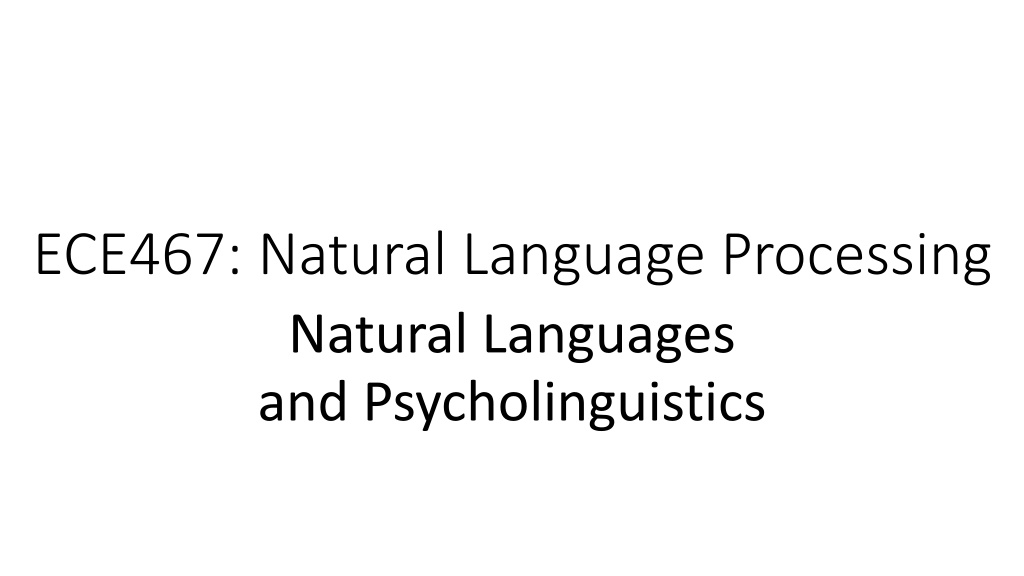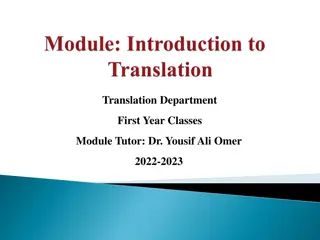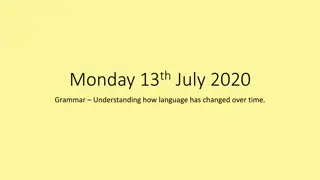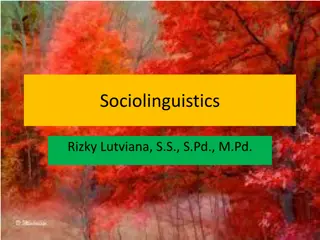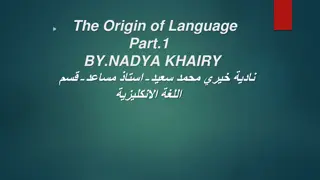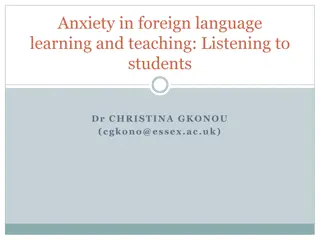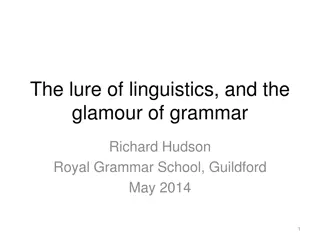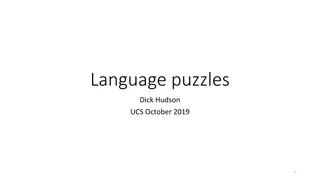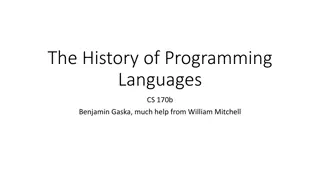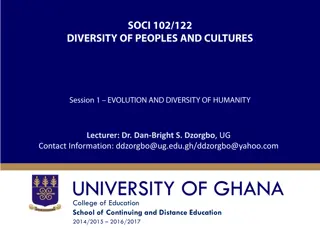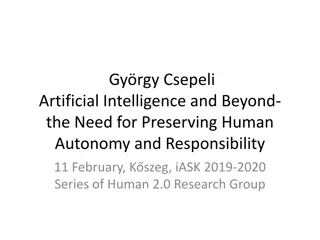The Intriguing World of Language Evolution
In discussions encompassing universal grammar, pidgins, and creole languages, the fascinating exploration of language evolution unfolds. Chomsky's concept of universal grammar proposes inherent linguistic principles, sparking debate among scholars. Pidgins, emerging as makeshift jargons, highlight language adaptation in diverse social contexts. Creole languages, born from pidgins, exhibit grammatical complexity and adherence to universal grammar principles. These linguistic phenomena shed light on the intricate interplay between language acquisition, social dynamics, and historical influences.
Download Presentation

Please find below an Image/Link to download the presentation.
The content on the website is provided AS IS for your information and personal use only. It may not be sold, licensed, or shared on other websites without obtaining consent from the author.If you encounter any issues during the download, it is possible that the publisher has removed the file from their server.
You are allowed to download the files provided on this website for personal or commercial use, subject to the condition that they are used lawfully. All files are the property of their respective owners.
The content on the website is provided AS IS for your information and personal use only. It may not be sold, licensed, or shared on other websites without obtaining consent from the author.
E N D
Presentation Transcript
ECE467: Natural Language Processing Natural Languages and Psycholinguistics
Universal Grammar Chomsky proposed that there is an innate set of linguistic principles called a universal grammar He and others have argued that this is why human children are able to learn language so fast To be clear, all linguists recognize that the grammars of different languages are very different However, there might be certain constructs that all human languages share in common In "The Language Instinct", Pinker makes a strong argument, in my opinion, in support of this view Pinker disagrees with Chomsky about certain aspects of the theory, however In general, the concept of a universal grammar is not extremely well defined, and it has been, and continues to be, controversial
Pidgins and Creole languages To me, one of the most compelling pieces of evidence discussed in "The Language Instinct" is the existence of pidgins and creole languages; note that the theories related to these concepts are also controversial A pidgin is a pseudo-language (Pinker calls it a "makeshift jargon") that develops when speakers of different languages are forced into situations where they need to communicate Unfortunate historical situations that have led to pidgins include slavery and indentured servitude Pinker: "Pidgins are choppy strings of words borrowed from the language of the colonizers or plantation owners, highly variable in order and with little in the way of grammar." Pinker cites evidence from the linguist Dereck Bickerton, who studied an episode in Hawaii just before the turn of the century (based partially on interviews conducted many decades later) After a boom in Hawaiian sugar plantations, "workers were brought in from China, Japan, Korea, Portugal, the Philippines, and Puerto Rico, and a pidgin quickly developed." According to Pinker, a pidgin can lead to the creation of a creole language in just one generation, when children of the pidgin speakers grow up together in the environment of the pidgin Related to the episode in Hawaii, Pinker writes, "Not content to reproduce the fragmentary word strings, the children injected grammatical complexity where none exists before, resulting in a brand-new, richly expressive language" Another example discussed by Pinker includes the development of a sign language at a school for deaf children in Nicaragua; according to Pinker, the first group of children developed a pidgin, but later children brought in at younger ages developed a creole According to Pinker, in all known cases of creole languages, based on studies of creole speakers and excerpts from creole languages, the grammars adhere to the principles of universal grammar
Similarities Between Languages The next portion of this topic is mostly based on content from "The Atoms of Language" by Mark C. Baker (although my own thoughts may be scattered throughout) We are going to consider the similarities and differences between grammars of different languages Some scientists/philosophers/psychologists have proposed the notion that people think in terms of language, and that a person's language might even limit the types of thoughts they can have This is a notion with which Pinker and Baker strongly and clearly disagree Languages differ in many ways, but there are certain principles they all (or almost all) share Some things, to me, are not too surprising; for example, (probably) all languages have nouns and verbs, all (seem to) have constituency, most have rules for inflection and derivation, etc. What I initially found surprising, however, is that there are many cases such that if a language has some feature X, it also has some other (on the surface unrelated) feature Y, with very high probability In the 1960s, a linguist named Joseph Greenberg empirically studied 30 languages of different types from around the world and discovered 45 universals Example (his Universal #4): "With overwhelmingly greater than chance frequency, languages with normal SOV order are postpositional."
Translating Between Languages Baker points out that languages are similar enough such that speakers fluent in multiple languages have little problem translating between them I add: Automatic machine translation (MT), which we will discuss during the third part of the course, is quite complex Only semi-recently have MT systems started to produce reasonable results Even human translators have difficulty when more than factual content must be preserved (e.g., when translating literature) Still, when it comes to translating factual content, a human who is fluent in multiple languages, can understand one and communicate the same information in another Baker also points out that languages are different enough such that adults have great difficulty learning new languages Children, on the other hand, seem to pick up languages automatically Near the start of "The Atoms of Language", Baker expounds on this notion by discussing what he calls, "The Code Talker Paradox" (discussed on the next slide)
The Code Talker Paradox The Code Talkers referred to a group of Navajo Native Americans that worked for the United States Marine Corps during WWII Basically, the military used the Navajo to transmit secret messages over radio; this "code" was never broken by the Japanese Note that modern encryption techniques did not exist at the time, so the Navajo code talkers were considered a very valuable asset The "paradox" is that English or Japanese and Navajo are similar enough such that the speakers had no trouble instantly translating, but different enough that the "code" could not be cracked In a later chapter, Baker defines E-languages (basically the set of sentences or texts that exist or make sense) versus I-languages (the rules that are used to define the languages) Apparently, these terms come from Chomsky, where the "E" stands for "extensional" and the "I" stands for "intensional" This is Baker's answer to the Code Talker paradox Comparing English or Japanese to Navajo, Baker concludes that the I-languages might be similar, whereas the E-languages are very different
Comparing Japanese and English Grammar In Chapter 3 of "The Atoms of Language", Baker compares the grammars of English and Japanese based on one translated sentence I personally consider this to be an excellent, detailed discussion that helped me to understand grammatical differences between languages (regardless of whether Baker's theory, which is controversial, is correct) The book starts with the Japanese sentence, but we'll first look at the translated meaning of the sentence in English: "Taro thinks [literally, is thinking] that Hiro showed a picture of himself to Hanako." Now let's look at a phonetic representation of the Japanese sentence (noting that this is not the only possible way it could have been phrased): "Taro-ja Hiro-ga Hanako-ni zibon-no syasin-o miseta to omette iru." Now consider the Japanese words translated into English, but keep the order from the Japanese sentence: "Taro-SU Hiro-SU Hanako-to self-POSS picture-OB showed that thinking be." Above, "SU" is a subject marker, "OB" is an object marker, and "POSS" is a postposition indicating possession similar to a use of "of" in English Note that even if you recognized all the Japanese words, you still likely would not know the meaning of the sentence if you are not familiar with Japanese grammar rules
Seven Apparent Grammatical Differences Baker points out what, at first, appear to be seven grammatical differences between English and Japanese: 1. English uses prepositions and contains prepositional phrases (e.g., "to Hanako"), but Japanese uses postpositions and has postpositional phrases (e.g., "Hanako-to") 2. In English, a prepositional phrase follows the modified noun (e.g., "picture of himself"), but in Japanese, a postpositional phrase precedes the modified noun (e.g., "self-POSS picture") 3. In English, a preposition phrase follows the related verb (e.g., "showed to Hanako"), but in Japanese, a prepositional phrase precedes the related verb (e.g., "Hanako-to showed") 4. In English, the object of a verb follows the verb (e.g., "showed a picture"), but in Japanese, the object of a verb precedes the verb (e.g., "picture-OB showed") 5. In English, an auxiliary precedes the main verb (e.g., "is thinking"), but in Japanese, an auxiliary verb follows the main verb (e.g., "thinking be") 6. In English, embedded clauses follow complementizers (e.g., "is thinking that <clause>"), but in Japanese, embedded clauses precede complementizers (e.g., "<clause> that thinking be") 7. In English, the entire embedded clause including the complementizer follows the main verb, but in Japanese, the whole clause precedes the main verb (the same example applies) The chart on the next slide summarizes these differences, discussed more on later slides
Statistics Related to the Seven Differences By itself, seeing "A precedes B" for English and "A follows B" for Japanese every time is not really that interesting, because entries from columns A and B easily could have been swapped However, Baker then presents some interesting statistics There are approximately 6,000 languages in the world I add: Obtaining an exact count of languages is complicated due to debates over what constitutes a language versus a dialect I further add: In "The Language Instinct", Pinker quotes the linguist Max Weinreich when discussing this topic: "A language is a dialect with an army and navy." Baker then discusses the two sets of word-order patterns defined in his Table 3.1 for English and Japanese Baker notes: "Putting aside certain minor variations, these two word-order patterns account for more than 95 percent of the languages of the world that care about word order at all." I add: The high majority of the approximately 6,000 languages do "care about" word order; the exceptions would include polysynthetic languages and some case-marking languages Baker continues: "Moreover, the two patterns occur in roughly equal numbers. Each type is found on every continent, and each includes more than 40% of the world's languages."
Baker's Explanation In attempting to explain this seemingly unusual empirical fact, Baker then points something out The item in column A is always a single word, while the item in column B is, or at least can be, a phrase (I add: the final row could have listed "verb phrase" instead of "verb" in column B) Baker then describes the concepts of phrases and heads of phrases I add: We discussed phrases in our previous topic, and we briefly mentioned that the head of a phrase is the word that is most syntactically important to the phrase Baker's big observation is then made clear: Each items in column A becomes the head of a larger phrase formed by combining the single word from column A with word or phrase from column B According to Baker: In English, the head of a phrase is almost always placed at the start of the phrase it is used to create; hence, English is known has a head-first (or head-initial) language In Japanese, the head of a phrase is almost always placed at the end of the phrase it is used to create; hence, Japanese is known as a head-last (or head-final) language Baker concludes that what first appeared to be seven grammatical differences between English and Japanese is really one difference between English and Japanese (the next slide expands on this) This is controversial; linguists don't always agree on what the types of phrases are, or on which word is considered the head, so it is debatable whether heads always come first or last in a particular language
Baker's Head Directionality Parameter Baker defines what he calls the "head directionality parameter" Either "heads follow phrases in forming larger phrases" (e.g., Japanese) or "heads precede phrases in forming larger phrases" (e.g., English) Note that the fact that both languages have subjects at the start of sentences (typically followed by a verb phrase) is not a contradiction or an exception A subject of a sentence is a phrase (specifically, a noun phrase), and the rest of the sentence is also a phrase (a verb phrase), so the head directionality parameter does not apply Baker believes that grammars of natural languages are formed (and learned) by setting values for a relatively small set of parameters, many of which he believes have not yet been discovered This relates to the notion of universal grammar, mentioned at the start of the topic Baker believes that humans have innate universal grammars with the parameters unset, and that children learn (subconsciously) the settings for them Baker gives examples of several proposed parameters throughout "The Atoms of Language" Another example is "the polysynthesis parameter", distinguishing languages such as Mohawk from languages such as English and Japanese (we discussed this during an earlier topic) The figure on the next slide depicts possible parameters, as speculated by Baker
Some Alternative Views (according to Baker) Baker admits that his views are controversial; however, he claims that most modern linguists believe in something similar to what he calls parameters Some alternative views of parameters discussed by Baker include: Rules exist in two or more versions, and a language must adopt one (basically Baker's view) Exactly the same rules exist in all languages, but with different priorities (e.g., heads come before associated phrases and heads come after associated phrases) This is called optimality theory, and Baker says there is evidence (in some languages) in its favor Basically, when a head is not able to take its place according to the usual rule, it takes the opposite position, as opposed to a place as close as possible to the usual position Parameters are keyed to properties of certain words; this is a lexical parameter approach Baker thinks this does not explain why virtually every head in English comes before the associated phrase I add: As mentioned earlier, some linguists debate whether this is true about English Some functionalists, stressing other aspects of cognition, believe that there are no simple rules, but there is functional pressure for a language to be efficient (to generate and parse) They would then claim that certain combinations of what Baker thinks of as rules and parameters do a better job than others Functionalists tend to see continuous variation across languages; here, Baker disagrees with them strenuously, claiming that this does not fit empirical evidence
If Baker is Wrong If Baker is wrong about parameters, we need another explanation for the fact that a high majority of languages resemble either English or Japanese in seven seemingly different ways Some might argue that languages evolve, and that the languages that share all seven features in common are historically (or perhaps culturally) related to each other Baker convincingly argues that this is simply not the case He points out that very similar grammars exist all over the world in languages that are not historically related to each other On the flip side, Baker claims that languages that are historically related to each other (and that therefore have similar lexicons) often have very different grammars In "The Atoms of Language", Baker also documents how some languages have changed over time A language might even flip the value of head directionality or polysynthesis parameters over time I add: I think this last point might help explain why some languages (a small percentage) might exhibit a pattern not quite like English or Japanese at some point in their history
Considering How Children Learn Language If Baker is correct, this may help explain one of the major mysteries about how children learn language Without parameters, the seven differences between Japanese and English should be able to exist in 128 possible combinations instead of 2 (and Baker gives other similar examples in his book) Indeed, the number of logically possible consistent grammars that could potentially exist is much higher than the number of languages in the world Many linguists (Chomsky included) have argued that without a universal grammar, a "poverty of stimulus" would make it impossible for children to learn language With a universal grammar, Pinker's "language instinct", and built-in, innate assumptions about the possible grammars of language, the task (while still difficult) becomes simpler With parameters, it becomes simpler still; subconsciously, children only need to notice enough examples language to set the parameters of a universal grammar First, they learn phonemes, then words (discussed as part of a previous topic), then they recognize phrases, then they notice the relationships between words and phrases On the other hand, in my opinion, Baker's theory may not adequately explain how multilingual children learn multiple languages (I have not seen anything by him attempting to explain this)
Descriptive vs. Prescriptive Grammars For our next subtopic, I want to address the question of whether grammars should be considered descriptive or prescriptive It seems clear to me that most modern linguists, including Baker and Pinker, strive to create grammars that are descriptive Related to this, returning to content from "The Language Instinct", my favorite chapter is Chapter 12, which Pinker titles "The Language Mavens" Pinker steals the term from the self-given title of a New York Times columnist who often used his columns to complain about what the journalist perceived to be the decay of the English language Pinker spends close to 40 pages mercilessly mocking anyone who believes that grammar should be prescriptive or who complains about the way that portions of society speak Pinker compares such a view to someone who would complain that a dolphin does not swim properly, or that a bird does not build its nest properly Pinker writes, "The way to determine whether a construction is 'grammatical' is to find people who speak the language and ask them."
Some Silly Rules (according to Pinker) Pinker proceeds to discuss many of the so-called grammar rules (rules that I learned at one time or another) and explains why he considers them nonsensical Here are just a few of many examples: Pinker claims it is often fine to end a sentence with a preposition; he mentions a witticism that might have originated from Winston Churchill: "It is a rule up with which we should not put" Pinker claims it is fine that certain dialects of English use double negatives; he says this was the norm in Middle English, and it is still the norm in some languages To people who complain that "I could care less" should be "I couldn't care less", Pinker says that "I could care less" is obviously sarcastic, and the complainers lack a sense of humor To those who complain that "everyone" should always be treated as a singular noun, Pinker poses the sentence "Mary saw everyone before John noticed them" and asks how to fix it Pinker believes that the use of "whom" in English will soon be a thing of the past, and he says this is no big deal Related to this last point, Pinker points out that "ye" used to be the subject form of "you", and now that "you" is used for both subjects and objects, we are no worse off Note that I still might sometimes "correct" some "improper usages" related to these issues if I encounter them in essays, even though I no longer consider them to be wrong
